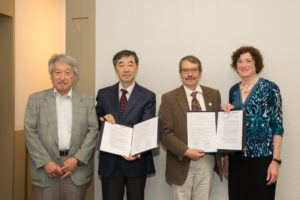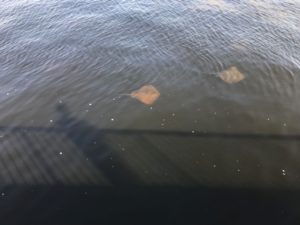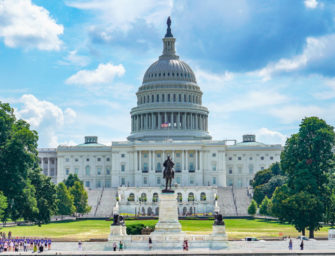Reflections on the 2018 Japan Geoscience Union Meeting
 Earth and space science is a global endeavor that succeeds only when investigators work together, unselfishly share ideas and data, and honestly peer review each other’s findings. In a year that has seen isolationism rise in countries across the world, I was fortunate to travel with Eric Davidson, AGU President, and connect with colleagues from around the world at the 2018 Japan Geoscience Union Meeting, held this year from May 2 -24 in Chiba, Japan where the interrelated nature of the global science enterprise was on full display.
Earth and space science is a global endeavor that succeeds only when investigators work together, unselfishly share ideas and data, and honestly peer review each other’s findings. In a year that has seen isolationism rise in countries across the world, I was fortunate to travel with Eric Davidson, AGU President, and connect with colleagues from around the world at the 2018 Japan Geoscience Union Meeting, held this year from May 2 -24 in Chiba, Japan where the interrelated nature of the global science enterprise was on full display.
As I walked through the Makuhari Messe convention center and attended meeting sessions, the energy and excitement was palpable. Undaunted by external global political upheavals, the quality of work and research in the Earth and space science present was resolutely strong. The atmosphere at the meeting was a congenial one that fostered communication, cooperation, and dialogue about research and discovery. Furthermore, it was markedly easier this year for non-Japanese speakers to participate in the meeting with a noticeable growth in English sessions, sessions presented in both Japanese and English, and oral presentations in Japanese that were illustrated with English slides.
On some of the issues that impact the ability for scientists to do their work, JpGU and EGU are collaborating with AGU. Although AGU is farthest along in its work to address the academic workplace culture – issues related to assuring the research enterprise is welcoming and free from discrimination, bullying and harassment – EGU and JpGU are also making strides. This was conveyed in one session on ethics and harassment, where leaders of all three societies presented. EGU has co-developed a joint society statement with AGU and JpGU has a committee that is beginning its work to address this systematic problem, taking things a step further by addressing the unintended consequences that research may have on people, animals, heritage sites and the natural environment.

With respect to data, FAIR data practices, and data sharing principles, AGU is a lead convener of this international charge. JpGU has initiated a new committee tasked with addressing these issues and, for the first time, held a day-long related session at this year’s meeting. At that gathering, presenters noted citizen science, community science partnerships (similar to AGU’s Thriving Earth Exchange partnership programs) and assuring the safety of individuals and communities are also essential parts of the open science effort.
There were also opportunities to formally and informally experience the warm hospitality and culture of Japan. We were greeted by the Mayor of Chiba during the Presidential recept
ion. In addition to honoring and celebrating the scientific achievements of this year’s JpGU’s awardees, the party afterwards featured sake tastings and a drawing for prizes that included items like ramen fixings and a kite. Outside of the convention center, it was a treat to see rays swimming in the channel in Tokyo Bay. And, one universal truth was confirmed: whether you’re in the U.S. or Japan, pictures in a menu can be radically different from what actually arrives at your plate.
Overall, it was great to again be part of the 2018 Japan Geoscience Union Meeting. While we are ever more interconnected via new and emerging technologies, face-to-face interactions remain paramount to building lasting relationships with our colleagues far and wide. And I look forward to the just formalized second AGU-JpGU joint meeting in 2020.




There are no comments
Add yours